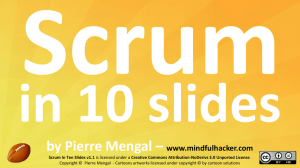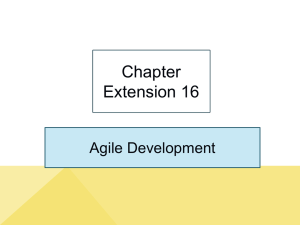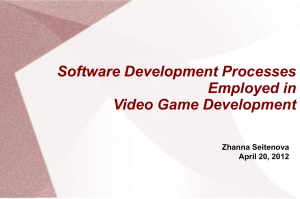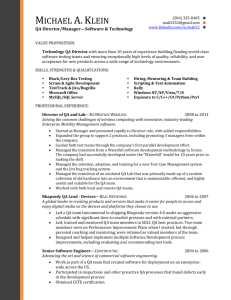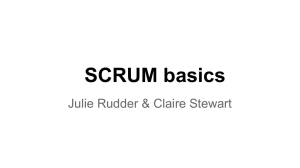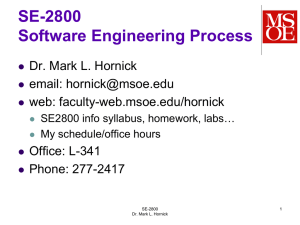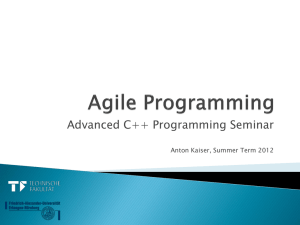Scrum Master Position Description
advertisement
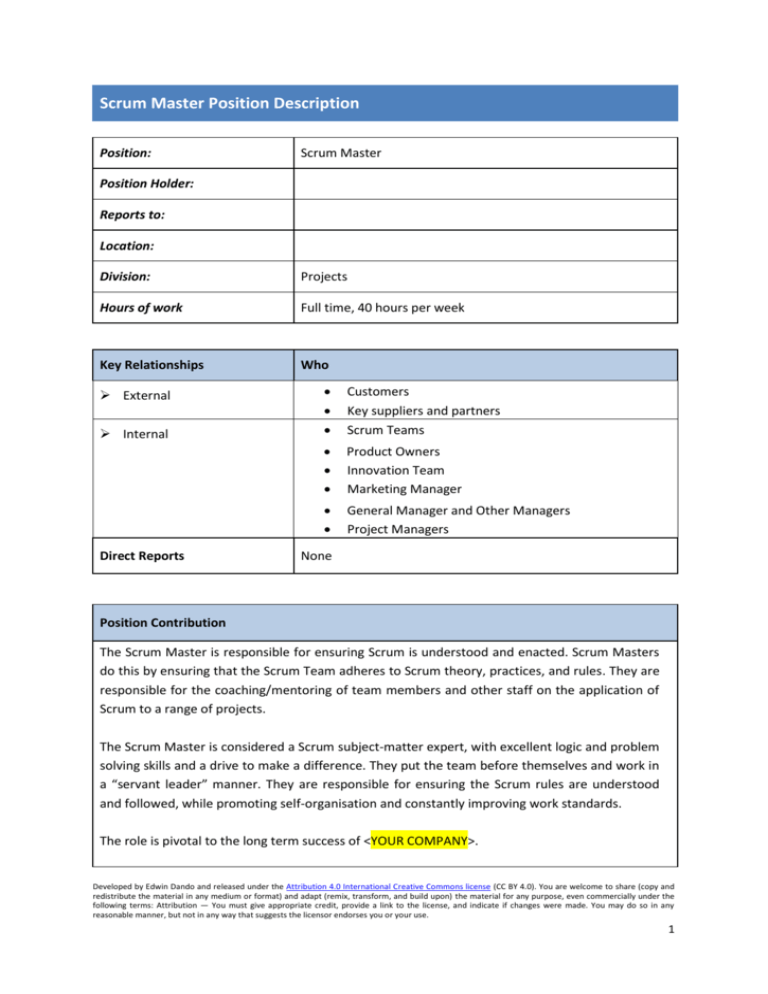
Scrum Master Position Description Position: Scrum Master Position Holder: Reports to: Location: Division: Projects Hours of work Full time, 40 hours per week Key Relationships Who External Internal Direct Reports Customers Key suppliers and partners Scrum Teams Product Owners Innovation Team Marketing Manager General Manager and Other Managers Project Managers None Position Contribution The Scrum Master is responsible for ensuring Scrum is understood and enacted. Scrum Masters do this by ensuring that the Scrum Team adheres to Scrum theory, practices, and rules. They are responsible for the coaching/mentoring of team members and other staff on the application of Scrum to a range of projects. The Scrum Master is considered a Scrum subject-matter expert, with excellent logic and problem solving skills and a drive to make a difference. They put the team before themselves and work in a “servant leader” manner. They are responsible for ensuring the Scrum rules are understood and followed, while promoting self-organisation and constantly improving work standards. The role is pivotal to the long term success of <YOUR COMPANY>. Developed by Edwin Dando and released under the Attribution 4.0 International Creative Commons license (CC BY 4.0). You are welcome to share (copy and redistribute the material in any medium or format) and adapt (remix, transform, and build upon) the material for any purpose, even commercially under the following terms: Attribution — You must give appropriate credit, provide a link to the license, and indicate if changes were made. You may do so in any reasonable manner, but not in any way that suggests the licensor endorses you or your use. 1 Key Accountabilities Support the Development Team turn product backlog items into done increments of software Primary Tasks Organize and facilitate the Scrum process as required. This may include, at first, arrange the key Scrum meetings, but a strong focus should be placed on helping the development team take ownership of these meetings themselves, as part of their journey to self-organisation. Help those outside the Scrum Team understand which of their interactions with the Scrum Team are helpful and which aren’t. The Scrum Master helps everyone change these interactions to maximize the value created by the Scrum Team. Help the Development Team ensure all the Scrum artefacts (Product Backlog, Sprint Backlog, Increment) are at all times transparent. This may include coaching the team find the appropriate tools and techniques for this, such as burndown charts, information radiators etc. Coach the development team to understand the importance of the Scrum values; respect, courage, openness, focus, commitment. Assist team forecast what may be possible and help them avoid making promises or hard commitments. Provide a Service to the Product Owner Find techniques for effective Product Backlog management Helping the Scrum Team understand the need for clear and concise Product Backlog items Understanding product planning in an empirical environment Ensuring the Product Owner knows how to arrange the Product Backlog to maximize value Provide a Service to the Development Team Understanding and practicing agility Facilitating Scrum events as requested or needed Coaching the Development Team in self-organization and crossfunctionality Helping the Development Team to create high-value products Removing impediments to the Development Team’s progress Developed by Edwin Dando and released under the Attribution 4.0 International Creative Commons license (CC BY 4.0). You are welcome to share (copy and redistribute the material in any medium or format) and adapt (remix, transform, and build upon) the material for any purpose, even commercially under the following terms: Attribution — You must give appropriate credit, provide a link to the license, and indicate if changes were made. You may do so in any reasonable manner, but not in any way that suggests the licensor endorses you or your use. 2 Facilitating Scrum events as requested or needed Coaching the Development Team in organizational environments in which Scrum is not yet fully adopted and understood Facilitate discussion and conflict resolution for the Development Team. Help the team understand the importance of ensuring they deliver completed, working software that complies to the agreed Definition of Done Provide a Service to the Organisation Leading and coaching the organization in its Scrum adoption Planning Scrum implementations within the organization Helping employees and stakeholders understand and enact Scrum and empirical product development Causing change that increases the productivity of the Scrum Team Working with other Scrum Masters to increase the effectiveness of the application of Scrum in the organization Developed by Edwin Dando and released under the Attribution 4.0 International Creative Commons license (CC BY 4.0). You are welcome to share (copy and redistribute the material in any medium or format) and adapt (remix, transform, and build upon) the material for any purpose, even commercially under the following terms: Attribution — You must give appropriate credit, provide a link to the license, and indicate if changes were made. You may do so in any reasonable manner, but not in any way that suggests the licensor endorses you or your use. 3 Qualifications, Technical Skills, Knowledge and Ability Excellent interpersonal skills, ability to work with diverse personality types. Thorough understanding of the trade-offs between velocity and quality. The ability to facilitate effectively. The ability to help a team galvanise and fine their own identity. Ability to coach the team to reach their highest potential. Thorough understanding of the challenges and idiosyncrasies of software development. Must be "self-motivated" as well as creative and efficient in proposing approaches to complex problems. Proven ability to work independently with limited supervision and with other department personnel. Must have exceptional communication, organization, and time management skills Thorough understanding of agile software development methodologies, values, and procedures Ability to understand technical issues at a high level Personal Characteristics: Passion to proactively seek ways to improve processes. Self-confidence to be assertive when taking a position and can constructively resolve problems. Creative, resourceful and innovative at tackling complex challenges (in a timely matter). Self-taught and self-teaching, with a demonstrated aptitude for acquiring knowledge and skills and new technologies readily. Organized and self-directing with the ability to identify priorities and mobilize projects in an orderly fashion to achieve desired results. Respectful, professional interpersonal working style. Uncompromising honesty and integrity. Approachable and willing to offer helpful solutions. Should handle constructive feedback well. Developed by Edwin Dando and released under the Attribution 4.0 International Creative Commons license (CC BY 4.0). You are welcome to share (copy and redistribute the material in any medium or format) and adapt (remix, transform, and build upon) the material for any purpose, even commercially under the following terms: Attribution — You must give appropriate credit, provide a link to the license, and indicate if changes were made. You may do so in any reasonable manner, but not in any way that suggests the licensor endorses you or your use. 4 Behaviours Innovative - feeling comfortable in fast-changing environments; being willing to take risks and to consider new and untested approaches. Strategic - taking a long range, broad approach to problem solving and decision making through objective analysis, thinking ahead, and planning. Excitement - operating with a good deal of energy, intensity, and emotional expression; having a capacity for keeping others enthusiastic and involved. Tactical - emphasizing the production of immediate results by focusing on short range, hands-on, practical strategies. Delegation — enlisting the talents of others to help meet objectives by giving them important activities and sufficient autonomy to exercise their own judgment. Communication - stating clearly what you want and expect from others - clearly expressing your thoughts and ideas; maintaining a precise and constant flow of information. Production - adopting a strong orientation toward achievement; holding high expectations for yourself and others - pushing yourself and others to achieve at high levels. Consensual - valuing the ideas and opinions of others and collecting their input as part of your decision-making process. Change focused - Identify themselves as change agents constantly challenge the way things are take advantage of opportunities for change understand that people are the key to change and work actively to gain trust before they introduce change. I have read and understood the above position description and accept all the above responsibilities incorporated herein. _________________________________ ___________________________ Scrum Master Date Developed by Edwin Dando and released under the Attribution 4.0 International Creative Commons license (CC BY 4.0). You are welcome to share (copy and redistribute the material in any medium or format) and adapt (remix, transform, and build upon) the material for any purpose, even commercially under the following terms: Attribution — You must give appropriate credit, provide a link to the license, and indicate if changes were made. You may do so in any reasonable manner, but not in any way that suggests the licensor endorses you or your use. 5 __________________________________ ____________________________ General Manager Date Developed by Edwin Dando and released under the Attribution 4.0 International Creative Commons license (CC BY 4.0). You are welcome to share (copy and redistribute the material in any medium or format) and adapt (remix, transform, and build upon) the material for any purpose, even commercially under the following terms: Attribution — You must give appropriate credit, provide a link to the license, and indicate if changes were made. You may do so in any reasonable manner, but not in any way that suggests the licensor endorses you or your use. 6
